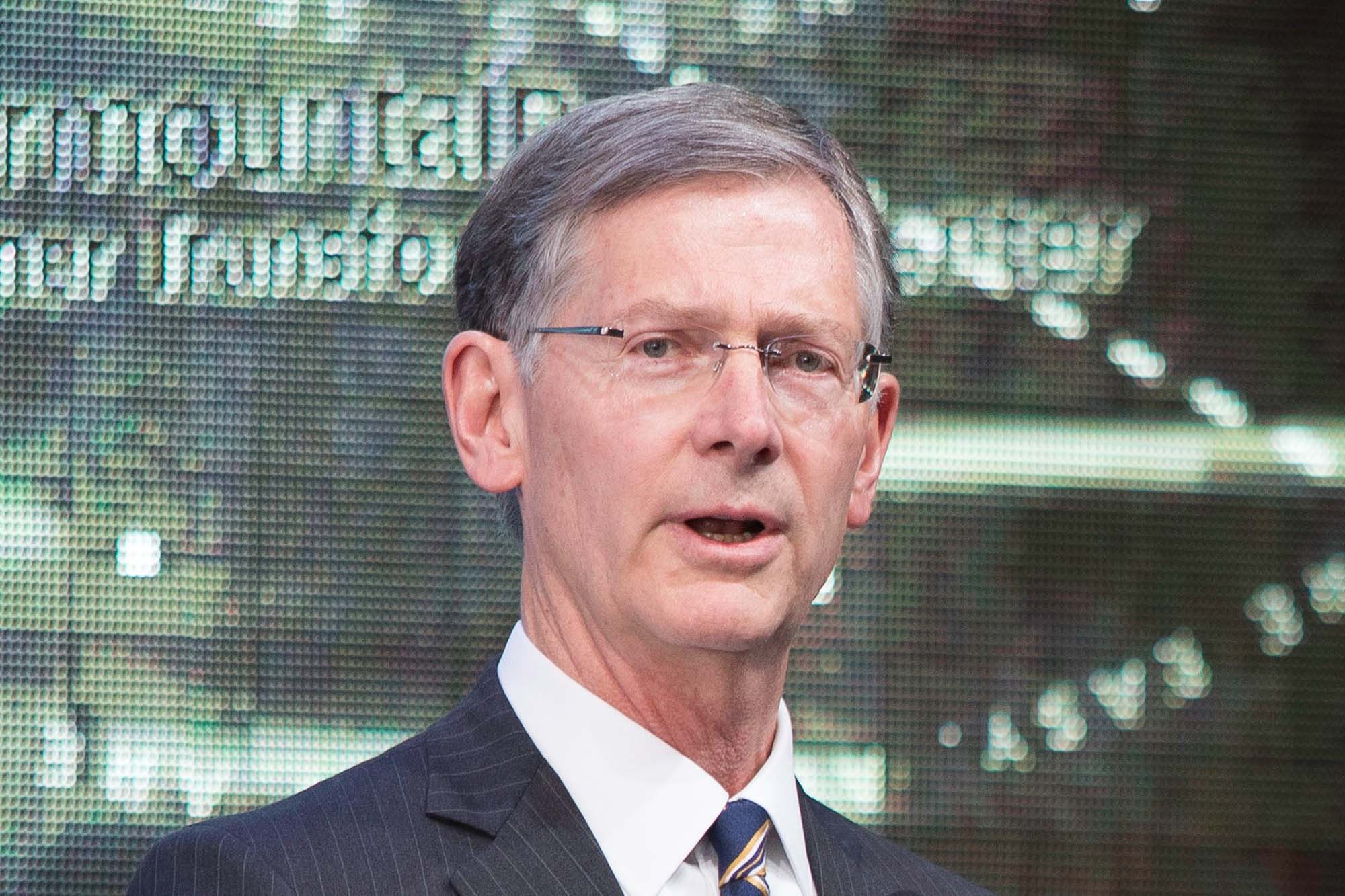
“My best trait is the ability to hang out with people who are far more capable than I am,” says Charles Sorenson, MD, FACS, in a 2020 interview. “I am not intimidated by working with people who are smarter than I am.”
The former president and CEO of Intermountain Healthcare, the Salt Lake City-based nonprofit regional healthcare system, and by some measurements the largest employer in Utah, must have been “hanging” with some pretty capable and smart people over the years . . . and vice versa. Now Emeritus CEO, the U Biology alumnus, HBA’74, has a long history at Intermountain as a urologic surgeon and physician leader. Today he serves as Founding Director of Intermountain Healthcare Leadership Institute.
The Salt Lake City native attended the University of Utah as a pre-med honors student with designs to go back east for professional school. Once he’d been accepted to Cornell Medical, he quickly learned that his undergraduate education had prepared him as well for graduate work “as Ivy League educations had done for my classmates. I’m particularly grateful for the extraordinary learning experiences I had through the Honors College,” he says.
He remembers his time as a student at what is now the School of Biological Sciences as a place with an “atmosphere of open dialogue, people who challenged my ideas and encouraged me to challenge theirs. Professors who genuinely cared about their students, some of whom became lasting mentors and models of professionalism and personal integrity.”
There were several U professors who were “remarkably engaging and committed.” But the one who had the most long-term influence on Sorenson was Homer R. Warner, MD, PhD former chair of the Dept of Biophysics and Bioengineering. In the honors class Warner taught there were just a handful of students, including Sorenson. “Homer was a brilliant, world-recognized innovator in the emerging field of computers in medicine. I ended up working in his lab for three years while going to school. He was an inspiring model of a dedicated physician scientist and also a leader who cared more about others than himself.” To Sorenson the doctor scientist remained a dear colleague, friend, and mentor until Warner passed away in 2012.
“I was a pretty good student,” says Sorenson in a Managed Healthcare interview, “and I wanted to go to medical school because it was the hardest thing I could think of doing, I always felt like doing hard things was good for me, and I always felt like this is what I always wanted to do.” The budding physician also had the example of his own father, a Salt Lake internist and of his mother, a nurse.
Sorenson’s penchant for leaning into “hard things” paid off. After Cornell, he returned to the U for his residency in general surgery and urology. Before his stint as CEO, Sorenson spent 11 years at Intermountain as executive vice president and chief operating officer.
During that time, he played a critical role in making clinical process improvements and developing Intermountain into an integrated delivery system. Beginning in the 90s, healthcare services nationwide were fragmenting and patients were no longer as much at the center of the equation as Sorenson believed they should be. To help remedy that, he teamed up to establish Intermountain Medical Group, an integrated practice of 1,500 physicians and advanced practice clinicians employed by the organization. Sorenson served as founding chair of the group’s board from 1994 to 1998.
Even after being coaxed into a full-time leadership role at Intermountain, Sorenson spent one day each week in surgical practice. That was fine with the board. They didn’t want him to go get an MBA; they wanted someone who understood clinical processes and frontline employees to further the organization’s mission.
That approach was eventually recognized shortly after Sorenson stepped down as CEO when he was awarded the 2017 Distinguished Service Award from the University of Utah’s School of Medicine. The accolade is given to healthcare leaders who’ve made outstanding contributions to the school, the community, and the practice of medicine. At the time Ron Larkin, MD, a retired OB/GYN and former Intermountain trustee, said of Sorenson’s honor, “He has as much integrity as any person I’ve ever met. He’s completely always wanting to do the right thing. He’s got such great intellect and such great judgment. He does do the right thing.”
If it sounds like under the leadership of Sorenson Intermountain has been re-inventing American healthcare as a mission-driven, patient-centered and employee-happy enterprise, that’s because it was, so much so that in 2009 President Barack Obama held the system up, more than once, as a model of quality, low-cost, integrated patient care.
About that acknowledgement from the White House Sorenson said, “While it’s easy for all of us, who know Intermountain so well from the inside, to focus mostly on ways we can still improve, it’s important to step back from time to time and appreciate the progress we’ve made. The president’s comments are a tremendous validation of the extraordinary work of our people in every one of Intermountain’s facilities and services.”
It seems that Charles Sorenson is always deflecting what are arguably his accomplishments back to his loyal front-line workers—in fact to everyone who together makes “hard things” happen well and economically at Intermountain.
It’s called leadership, the execution of it and the training of others in it, something that Sorenson is deeply embedded in now as Director of the Healthcare Leadership Institute. Even the advent of the coronavirus pandemic could not stop him. “We transitioned our program at the … Institute from an intensive on-site two weeks for healthcare leaders to an all-virtual, three-month program. While we look forward to being able to return to our beautiful Institute with in-person programs, virtual sessions have been well received and highly rated by participants—so they’ll always be a component of our program.”
These days Sorenson has had more time to spend with his four adult children and his grandchildren. With his wife Sharee, he has spent time volunteering, including working with refugee families from Central Africa. He has served on the Board of Providence Health, a very large not-for-profit health system based in Seattle, since 2018. He also recently joined MEDI, the largest executive coaching firm in the nation dedicated exclusively to the healthcare industry as an executive coach.
With more time on his hands, he enjoys music, hiking and biking and catching up on his reading. Some recent favorites have included The Second Mountain by David Brooks, Churchill by Andrew Roberts, The Culture Code by Daniel Coyle, Sea Stories by William McRaven, After by Dr. Bruce Greyson, and Facing the Mountain by Daniel James Brown.
In addition to modeling his notion of hanging out with people whom he believes are smarter than he, Charles Sorenson’s advice to students is trenchant as they navigate a world that can be taxing and at times even despairing:
- Have the courage to embrace new ideas—even if they initially seem to challenge your own ways of thinking. But be careful not to be dragged along by what seems fashionable today but is not based on sound logic or in the best long-term interests of society.
- Never neglect your personal values—always striving to improve and raise those values to higher levels.
- Be very careful about those with whom you spend your time— professionally and personally. We become, for better or for worse, like the people with whom we spend our days.
- Learn to be a “forever learner,” and help others to do the same.
- Be generous and be grateful. You’ll be the greatest beneficiary of the help and thanks you extend to others.
It is advice from a leader and a coach of health executives that stems from a lifetime of achievement . . .of doing “hard things.”
By David Pace
The Science Research Initiative scholarships at SBS places first-year undergraduates into the field/lab their first semester to learn by researching. You can learn more about the SRI here.

